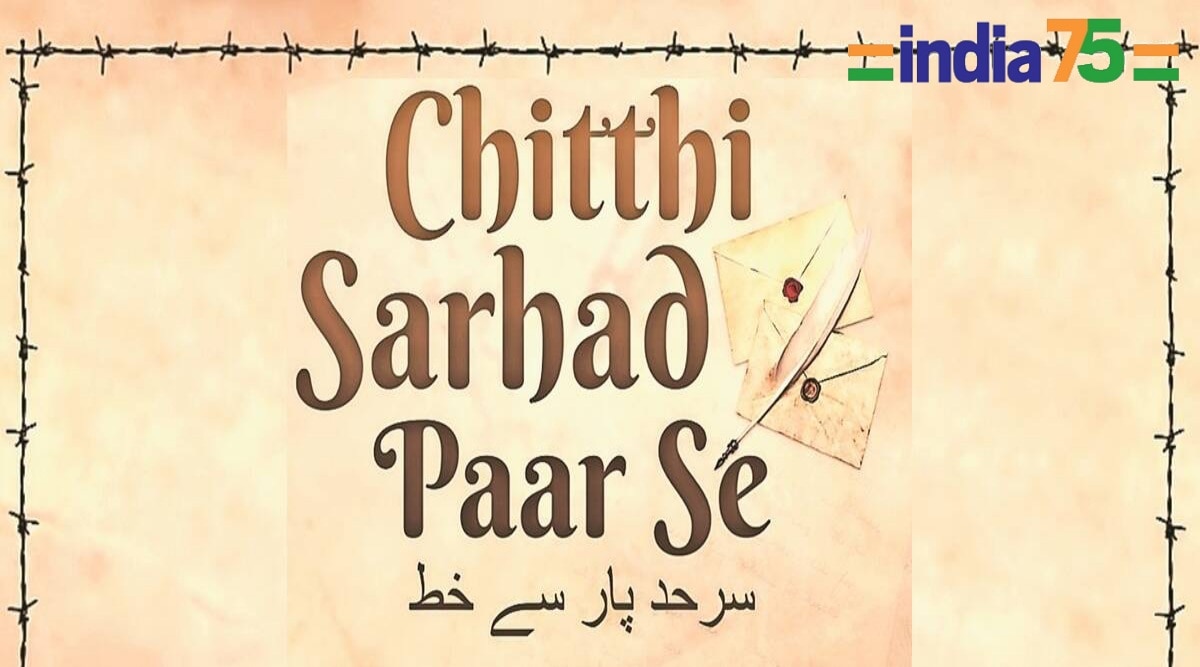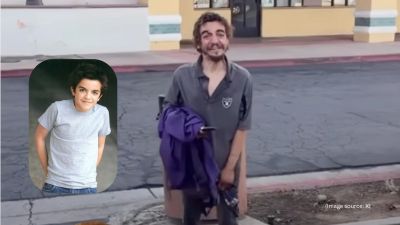
-‘I am stuck at the very start of this letter as I am unable to address you. Should I address you as I used to do before? It’s very odd for me to call you with your full name. Should I call you with your nickname? Every night that I open my notepad to write to you, my eyes fill up and I have to leave my pen without writing a word. Today, I am allowing tears to fall on the page… Do you remember how you used to say that the day I forget you, you will punch me on my big jaw? Why don’t you come, then? Do you know we decided to name our first child after you?’
-‘I only wanted to eat those dahi bhalle which your mother used to make on Diwali. I wanted to play colors with you and while playing I wanted to tell you that how dark the days were in your absence.’
Seventy five years after India and Pakistan became two separate countries — dissecting Punjab and hearts of people on both sides — writing letters remain the strongest and probably the longest surviving connection between people of the two countries, to pour out their hearts with words soaked in the ink of love, remembrance, pain and nostalgia.
From a 90-year old man’s granddaughter writing to his friend after his death, to a woman married at tender age of 15 and asking his brother to send her mother’s last memory, the letters from both sides of the border have now been compiled in a book — “Chitthi Sarhad Paar Se (A letter from across the border) ” — released both in India and Pakistan.

Except for the three-month brief period in 2019 when the postal exchange between both countries stopped due to heightened tension following abrogation of Article 370 from Jammu & Kashmir, letters have always been the strongest medium used by people from both sides to capture the pain and trauma of a nation being split—- and to express the lingering pain that couldn’t be said with spoken words.
Story continues below this ad
The unique initiative taken by two publishing houses from both sides to bridge the gap between people on the two sides of the border. Chandigarh-based White Falcon Publishing House in collaboration with Daastan, based in Islamabad, opened a contest in January 2020 “Chitthi Sarhad Paar se”, inviting entries from both sides of the letters that people of India and Pakistan wrote to each other. As many as 350 entries, including 300 from Pakistan and rest from India, were received and 32 best entries are now a part of the book, which has been released in India on 75th Independence Day. In Pakistan, however, the book was released last year.
“Our release got delayed due to Covid. But it is finally here now. We had decided to do this project with Daastan not because of some profit but to let people from both sides express their feelings. There isn’t a better way to express than writing. We even received entries from 80 to 90 year-olds which says a lot about what a tragedy the partition was,” says Navsangeet Kaur, founder cum owner, White Falcon Publishing House, Chandigarh.
While entries from India side were mostly in English and Hindi, in Pakistan they were received in Urdu and Shahmukhi Punjabi. The compiled book has a total of 32 best letters in all four languages.
Syed Ommer Amir, founder and CEO, Daastan, said, “In today’s world of the internet and social media, we have lost and forgotten the essence of writing and reading a letter. But when we received more than 300 entries from Pakistan side, it was evident that people still love writing letters to their loved ones in India, with a hope that it will reach them,” he said.
Story continues below this ad
The book running into 156 pages has been priced at Rs 199 and can be ordered online. In some letters, writers also mentioned that since their previous letters did not reach the destination, they are hopeful that this letter would reach the person at least through the book.
Even during the heightened tensions and even wars, postal service has been one connection that has remained intact between India and Pakistan and exchange of mailbags has continued through Wagah border or flights. It was only in August 2019 when the postal exchange had stopped briefly after Pakistan unilaterally stopped accepting posts from India following abrogation of Article 370 from Jammu & Kashmir. However, it was partially resumed after three months in November that year.
For people of both countries, especially undivided Punjab, India’s Independence never translated into a “celebration” and for many, closures are yet to come. While many such letters never found their destinations, some who migrated to India from Pakistan and vice-versa are still looking for the homes they left behind, families who were never found, loving neighbors becoming enemies and horrifying memories of escaping death– all within a day on August 14-15, 1947.
But home where one grows, remains a home, forever.
“Agar mere ghar ke tukde milein kahin, unhein sambhal kar rakh loge na tum? Aakhir ghar toh voh tumhara bhi tha..,” wrote a man in a letter, who had to leave his home in Lahore.
Story continues below this ad
75 years on, the lingering pain (Excerpts from the letters published in the book)
– From a 90-year old, to his childhood friend
A man in his nineties from India, breathed his last with pain in his heart and a wish– to post a letter to his friend in Pakistan. He was hopeful that his letter would certainly find his friend’s home, one day. He wrote the letter with the help of his granddaughter, before his death. He wrote:
Pyare Aamir,
If this letter ever finds you, I hope it finds you well. The biggest syllogism in this age of 90s is, if this letter will ever get the prerogative of reaching you, and if, by God’s grace it does, will you be able to recognise me, your friend of the past, of about 70 years ago. I, myself, am castellated with zillion ailments, stammering voice, opacified eyes, withered skin and what not. In these days of aloofness, I more often recall our days of carefreeness, of vigour, of love, of peace, of before 1947. My granddaughter has agreed to be my messenger, she is writing this letter for me, you know my hands are not strong enough to form words. She often urged that I should write or talk to you but the fact that after partition, I didn’t really know your whereabouts, always acted as a hindrance. But now she has promised to locate you and post this letter.

To take our country ahead was our vision, temple and mosque were worshipped without division. The nation belonged to all, not any particular religion, Those were the days, when Delhi and Islamabad was one region. Then came, the fateful nineteen forty seven, hell got loose, in search of heaven, There was bloodshed, the cries were brazen, Those days were lost, the friendships hazed.
Story continues below this ad
The man’s granddaughter, added a note: “Hello uncle, I am Kavita, your friend’s granddaughter. Grand dad breathed his last while narrating this letter to me but I know he died in peace. There was a strange smile and calmness on his face, and your memories made him happy. He died with the hope, that one day this letter will find you and you will know how much he missed you all these years.
– From a man who traveled with corpses in a train from Lahore
I always thought that the streets I grew up in were rather brown, covered in the filth that seemed to flow out of every corner of the town.. But that day, the streets were running red, irrespective of the color of the religion of those whose blood it was, blood that flowed in from all the corners like the tributaries of the Sindhu River. People I met later said that the river had become the abode of all those lost souls who couldn’t find home in either of the nascent nations.
Many jumped in the river to save themselves from the shame of being killed at the hands of a recently sworn nemesis.

Story continues below this ad
I had never known Allah, nor had I ever known Gandhi or Jinnah but somehow the entirety of my being had been fashioned by their whims. It makes really angry, as angry as it did that night, when I did not know whom I was blaming. I did not know where I was going, the only thing I knew was that I would be killed in some parts of Punjab and given refuge in others.
I was separated from my parents on a railway station, but I never found them. On many occasions later in life, I have wondered if they were killed then. I would listen to the radio all day in case their names came up since that is what everyone else did. The string of familiar names belonging to strangers was the only respite many of us got, and that too was laced with blood that should never have spilled.
Agar mere ghar ke tukde milein kahin, Unhein sambhalkar rakhloge na tum? Akhir ghar toh voh tumhara bhi tha…
– From a friend who was hopeful of returning to Delhi, again
Story continues below this ad
‘..When a young boy was brutally murdered in front of the big white mosque and a girl raped… that day, nothing was safe. Abba was anxious. He insisted we leave the house before sunset. I wanted to come to your house and meet you one last time. I wanted to hug you tightly but Abba was afraid. I wanted to leave a farewell note but I didn’t write because Abba promised me that once the things get settled, we will be back. At the time of departure our hearts were crying. Do you know why we never came back? Because things never settled. I know you cursed me the next morning when you came to our house for breakfast and no one was there. I know you wept bitterly when the walls and swings in my courtyard didn’t answer your questions. I know you asked every passerby about us. Can you believe that in those years I only missed you when I breathed? I knew that there was no home there but that you were there. It was you with whom I wanted to wander in the streets of our locality. I only wanted to eat those dahi bhalle which your mother used to make on Diwali. I wanted to play with colors with you and wanted to tell you that how dark the days were in your absence. On this side of border, the heart of your sister bleeds. I don’t know why a broken heart aches. It aches from the moment I left our Delhi. Is it still ours? Have you collected all the pieces of this puzzle called life? Do you still like dal chawal? I am daring to smile while writing your name…’
From Sarwat
– From a girl married at 15, sent to Karachi, longing for her mother’s last memory

Dear bhaiya,
I know you remember the fear in my eyes the day I got married. I was only fifteen and you sent me with my husband to this new country called Pakistan. I wish I had known then that it was the last time I would be seeing Amma and what that actually meant. It would be the last time I would be feeling her touch and the last time my mother would be wiping away my tears. I am a grandmother of two girls today, yet every time I call you Bhaiya, it takes me back to our childhood. But the truth is I am not a little girl anymore. Bhaiya I want to tell you, you were right– I found my home here, I discovered myself and built my life just like you said. And today my love for my home is engraved deeply in my veins and into my soul. But despite this strong force of loyalty and love, a voice in my heart pushes me to take a step towards you and open my heart to those across the border. Bhaiya I wish I could break all the barriers separating us: the borders, the bloodshed, the hate, the loyalties and responsibilities. My heart is open with respect and love to your people across the border and I am hoping the same from you for my people. Mahnoor Nadeem Bhaiya, I have a dream. I want to feel Amma’s presence. I want to be reminded of Amma’s fragrance. I want to make up for all the years I could not be with her. I want to feel her warmth again. I hope I could make every individual of both the nations separated by the border and make them feel the importance of love, warmth and relationships. I dream of waking up one day without these boundaries, meeting again in a place where we would be connected. You will pass on Amma’s white chaadar to me; the one she would always pray with…. until we meet her again…













